 T H E T H E O L O G Y O F A U G U S T I N E S C O N F E S S I O N S Thisstudyofthe Confessionsengageswithcontemporaryphilosophersand psychologistsantagonistictoreligionanddemonstratestheenduringvalueof Augustinesjourneyforthosestrugglingwiththeisticincredulityandreligious narcissism.PaulRigbydrawsoncurrentAugustinianscholarshipandtheworksof PaulRicoeurtocross-examineAugustinestestimony.Thisanalysisrevealsthe sophisticationofAugustinesconfessionaltext,whichanticipatestheanalytical mind-setofhiscritics.Augustinepresentsacoherent,defensibleresponsetothree age-oldproblems:freewillandgrace;goodness,innocentsuffering,andradicalevil; andfreedomandpredestination. TheTheologyofAugustinesConfessionsmoves beyondcommentaryandallowspresent-dayreaderstounderstandthe Confessionsas itsoriginalreadersexperiencedit,bridgingthedivideintroducedbyKant,Hegel, Freud,Nietzsche,Heidegger,andtheirdescendants. PaulRigbyisaprofessorintheFacultyofHumanSciencesatSaintPaulUniversity. Heistheauthorof OriginalSininAugustinesConfessions.
T H E T H E O L O G Y O F A U G U S T I N E S C O N F E S S I O N S Thisstudyofthe Confessionsengageswithcontemporaryphilosophersand psychologistsantagonistictoreligionanddemonstratestheenduringvalueof Augustinesjourneyforthosestrugglingwiththeisticincredulityandreligious narcissism.PaulRigbydrawsoncurrentAugustinianscholarshipandtheworksof PaulRicoeurtocross-examineAugustinestestimony.Thisanalysisrevealsthe sophisticationofAugustinesconfessionaltext,whichanticipatestheanalytical mind-setofhiscritics.Augustinepresentsacoherent,defensibleresponsetothree age-oldproblems:freewillandgrace;goodness,innocentsuffering,andradicalevil; andfreedomandpredestination. TheTheologyofAugustinesConfessionsmoves beyondcommentaryandallowspresent-dayreaderstounderstandthe Confessionsas itsoriginalreadersexperiencedit,bridgingthedivideintroducedbyKant,Hegel, Freud,Nietzsche,Heidegger,andtheirdescendants. PaulRigbyisaprofessorintheFacultyofHumanSciencesatSaintPaulUniversity. Heistheauthorof OriginalSininAugustinesConfessions.  T H E T H E O L O G Y O FA U G U S T I N E SC O N F E S S I O N SPaulRigbySaintPaulUniversity
T H E T H E O L O G Y O FA U G U S T I N E SC O N F E S S I O N SPaulRigbySaintPaulUniversity 32AvenueoftheAmericas,NewYork,NY10013-2473,USA CambridgeUniversityPressispartoftheUniversityofCambridge. www.cambridge.org Informationonthistitle:www.cambridge.org/9781107094925 PaulRigby2015 Thispublicationisincopyright.Subjecttostatutoryexceptionandtotheprovisionsofrelevantcollectivelicensing agreements,noreproductionofanypartmaytakeplacewithoutthewrittenpermissionofCambridgeUniversity Press. www.cambridge.org Informationonthistitle:www.cambridge.org/9781107094925 PaulRigby2015 Thispublicationisincopyright.Subjecttostatutoryexceptionandtotheprovisionsofrelevantcollectivelicensing agreements,noreproductionofanypartmaytakeplacewithoutthewrittenpermissionofCambridgeUniversity Press.
32AvenueoftheAmericas,NewYork,NY10013-2473,USA CambridgeUniversityPressispartoftheUniversityofCambridge. www.cambridge.org Informationonthistitle:www.cambridge.org/9781107094925 PaulRigby2015 Thispublicationisincopyright.Subjecttostatutoryexceptionandtotheprovisionsofrelevantcollectivelicensing agreements,noreproductionofanypartmaytakeplacewithoutthewrittenpermissionofCambridgeUniversity Press. www.cambridge.org Informationonthistitle:www.cambridge.org/9781107094925 PaulRigby2015 Thispublicationisincopyright.Subjecttostatutoryexceptionandtotheprovisionsofrelevantcollectivelicensing agreements,noreproductionofanypartmaytakeplacewithoutthewrittenpermissionofCambridgeUniversity Press.
Firstpublished2015 PrintedintheUnitedStatesofAmerica AcatalogrecordforthispublicationisavailablefromtheBritishLibrary. LibraryofCongressCataloginginPublicationData Rigby,Paul,1941 ThetheologyofAugustines Confessions/PaulRigby,SaintPaulUniversity. pagescm Includesbibliographicalreferencesandindex. ISBN978-1-107-09492-5(hardback) 1.Augustine,Saint,BishopofHippo.Confessiones.2.TheologyHistoryEarlychurch,ca.30600.I.Title. BR65.A62R552015 270.2092dc232014043432 ISBN978-1-107-09492-5Hardback CambridgeUniversityPresshasnoresponsibilityforthepersistenceoraccuracyofURLsforexternalorthird-party InternetWebsitesreferredtointhispublicationanddoesnotguaranteethatanycontentonsuchWebsitesis,or willremain,accurateorappropriate. ToMariaPeter,Jamie,Mireille,andMatthewContentsPreface Augustines Confessionsismymagicbook,afriendofmineremarkedmanyyearsago.
IhavebeenimmersedinAugustines Confessionsformorethanfortyyears.Myinterestin humantimeandtheuseoftheconfessionalmediumtoregaintimegobackto1969and my reading of Prousts Remembrance of Things Past and a complementary interest in Husserls LecturesonInternalTimeConsciousness.Ontheopeningpageofhisinfluential lectures,HusserlsaysthatBook11ofthe Confessionsistheonlyseriousreflectiononthe topic.IturnedasideandreadAugustineandhavebeenreadinghimeversince.Atthetime IdidnotintendtostudyAugustine,butwhatinthelongrunheldmyinterestwasnotonly hisabilitytoraiseinanoriginalwayquestionsofcontemporaryinterestbutthereverse thesurpluslatentinhisstrangeness. Intheinterveningyears,Ihavewrittenamastersthesisandadoctoralthesisonthe Confessions. I recall that at that time, on my way to the library, the theologian Bernard Lonergan announced to me in his apodictic and stentorian voice: Remember, all a doctoralstudentmustproveisthathecanreadonetext.Ihavebeentryingtoreadthat one text ever since. My 1987 book Original Sin in Augustines Confession is the culminationofthisearlierwork,anditsfindingondualismandoriginalsinstillfindsan importantplaceinofthepresentwork.Indeed,thepresentbookcan bereadasacompaniontoandcontinuationoftheearlierwork.Noteespeciallysection2 ofchapter1ofthe1987bookonTheRoleofTheologyinthe Confessions. An important advance over the earlier work has been the philosophical scaffolding andsite,evenawitnessstand,providedbyPaulRicoeurforreinterpreting,interrogating, andcross-examiningAugustinesstrangetestimony.Myfirstattempttodeconstructand recuperate Augustines witness Paul Ricoeur, Freudianism, and Augustines Confessions, ofthepresentbook.Theyaretheresultofmystruggleto understand what I regard as the foundational theology of the Confessions the incarnation, original sin, electing grace, and predestination using Ricoeurs theory of narrativeuniversals. that the picture became clear and that the present book was conceived. that the picture became clear and that the present book was conceived.
I had long believed that AugustinediscoveredinPaul AdSimplicianum,writtenshortlybeforethe Confessions a bewildering ethics, in which one establishes ones own standard of judgment only to haveitblownawayinthescornofdivinelaughter.Ialsoknewthatthisanti-voluntaristic ethicsisthepivotaltheologicalinsightofthe Confessions.WhatIhadnotrealizedtillnow isthatAugustinehadheardthesamedivinelaughterathispress-gangedordination,and thatthisinsightintothedivinescornlaybehindhisclaiminthe Confessions,whichclaim Cappshadcalledintonarcissisticquestion: Terrifiedbymysinsandthemassofmymisery,Ihadponderedinmyheartand thoughtofflighttothedesert;butyoudidforbidmeandstrengthenme,saying: AndChristdiedforall:thattheyalsowholive,maynownotlivetothemselves butwithhimwhodiedforthem. (10.43.70) ThepeopleofHippoliterallystoppedAugustineinhistracks.Hisconfession,hisbearing witnesstohissummons,hiscoercedcalltoresponsibilityforall,isthetestimonyofhis Confessions. What is striking is that coercion subserves freedom, freedom to serve all. Whythecoercionthen?Augustinerecallsinthefirsteightbooksofthe Confessionsand the first twenty-three chapters of Book 10 the futile years of restless search for true happiness, only to discover that he had always been ineluctably bound in a fundamental hatredofthetruththatcouldenlightenmenthimandthatonlythedivinelaughtercouldset himfree. Asthemanyintimatepassagesofthe Confessionsamplyattest,divinederisionisthe gatewaytofreedom,toanamorousdelight,toanirresistiblejoythatAugustinemakeshis own. But Augustine insists on the anti-voluntaristic nature of this prevenient call.
Grace always goes before; it is coercive for its joy is awesome, and its irresistible delight is a tremendumleadinghimwherehewouldrathernotgo,whetheritistothecontinenceof Book8ortheordinationofBook9. Augustine uses the image of the song and the canticle to understand the prevenient andcoerciveforceofthisgrace.InBook12ofthe Confessions,hesaysthatthematterout of which God created was not prior in time or value to form but only in origin, in lowliness,assoundistoasong.Sohisfreewillisnotpriorintimeorvalue.Assoundis tosong,sofreewillscurrentlowliness,itsethicalbondage,istotheamorousdelightin truehappinessthatsetsitfree.Totheextentthatthewillisbound,thecalltolovemustbe acommand.Ineluctablebondagerequirescoercive,irresistibledelight.Thesong,recall,is awesome,a tremendum;assuchitisacoerciveforceleadingAugustinetounanticipated freedom in an ever deeper unknowing, an enlightened unknowing, a docta ignorantia. The song can never be anticipated or preknown; it can only be an amorous delight in whichthesonghasalreadymovedonbeyonditsappropriation.Theattempttoreifyorto manipulate the song leaves only an involuntary trace in the divine laughter. The songs coercivepowerdrawsAugustinewherehewouldnotgo. The song is, of course, the Canticle of Book 11, Ambroses
Next page

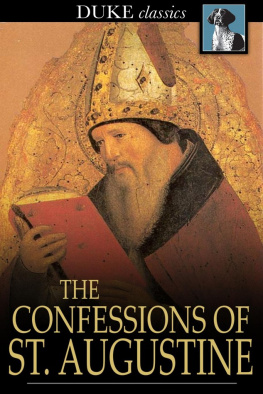
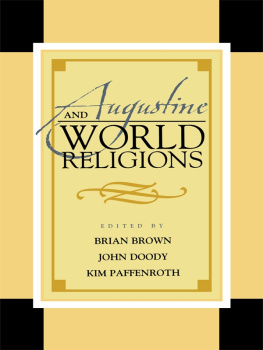
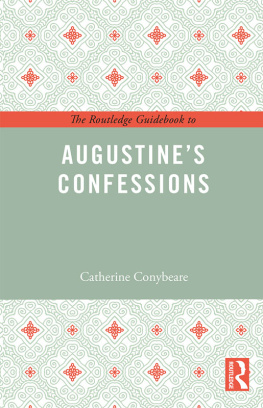
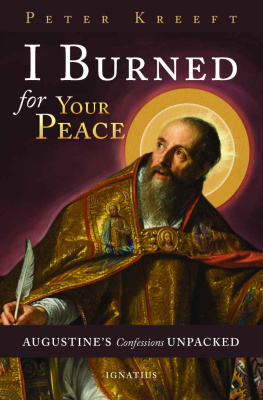
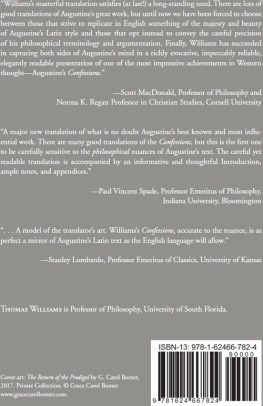
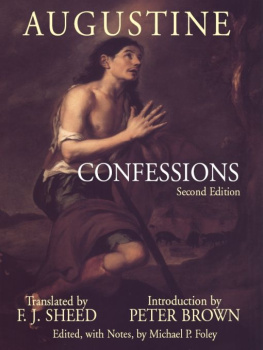
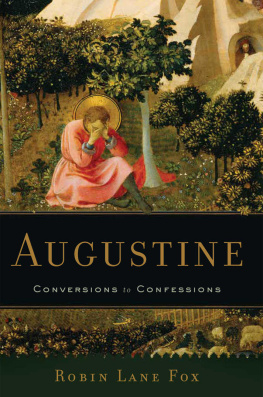
 T H E T H E O L O G Y O F A U G U S T I N E S C O N F E S S I O N S Thisstudyofthe Confessionsengageswithcontemporaryphilosophersand psychologistsantagonistictoreligionanddemonstratestheenduringvalueof Augustinesjourneyforthosestrugglingwiththeisticincredulityandreligious narcissism.PaulRigbydrawsoncurrentAugustinianscholarshipandtheworksof PaulRicoeurtocross-examineAugustinestestimony.Thisanalysisrevealsthe sophisticationofAugustinesconfessionaltext,whichanticipatestheanalytical mind-setofhiscritics.Augustinepresentsacoherent,defensibleresponsetothree age-oldproblems:freewillandgrace;goodness,innocentsuffering,andradicalevil; andfreedomandpredestination. TheTheologyofAugustinesConfessionsmoves beyondcommentaryandallowspresent-dayreaderstounderstandthe Confessionsas itsoriginalreadersexperiencedit,bridgingthedivideintroducedbyKant,Hegel, Freud,Nietzsche,Heidegger,andtheirdescendants. PaulRigbyisaprofessorintheFacultyofHumanSciencesatSaintPaulUniversity. Heistheauthorof OriginalSininAugustinesConfessions.
T H E T H E O L O G Y O F A U G U S T I N E S C O N F E S S I O N S Thisstudyofthe Confessionsengageswithcontemporaryphilosophersand psychologistsantagonistictoreligionanddemonstratestheenduringvalueof Augustinesjourneyforthosestrugglingwiththeisticincredulityandreligious narcissism.PaulRigbydrawsoncurrentAugustinianscholarshipandtheworksof PaulRicoeurtocross-examineAugustinestestimony.Thisanalysisrevealsthe sophisticationofAugustinesconfessionaltext,whichanticipatestheanalytical mind-setofhiscritics.Augustinepresentsacoherent,defensibleresponsetothree age-oldproblems:freewillandgrace;goodness,innocentsuffering,andradicalevil; andfreedomandpredestination. TheTheologyofAugustinesConfessionsmoves beyondcommentaryandallowspresent-dayreaderstounderstandthe Confessionsas itsoriginalreadersexperiencedit,bridgingthedivideintroducedbyKant,Hegel, Freud,Nietzsche,Heidegger,andtheirdescendants. PaulRigbyisaprofessorintheFacultyofHumanSciencesatSaintPaulUniversity. Heistheauthorof OriginalSininAugustinesConfessions.  T H E T H E O L O G Y O FA U G U S T I N E SC O N F E S S I O N SPaulRigbySaintPaulUniversity
T H E T H E O L O G Y O FA U G U S T I N E SC O N F E S S I O N SPaulRigbySaintPaulUniversity 32AvenueoftheAmericas,NewYork,NY10013-2473,USA CambridgeUniversityPressispartoftheUniversityofCambridge. www.cambridge.org Informationonthistitle:www.cambridge.org/9781107094925 PaulRigby2015 Thispublicationisincopyright.Subjecttostatutoryexceptionandtotheprovisionsofrelevantcollectivelicensing agreements,noreproductionofanypartmaytakeplacewithoutthewrittenpermissionofCambridgeUniversity Press. www.cambridge.org Informationonthistitle:www.cambridge.org/9781107094925 PaulRigby2015 Thispublicationisincopyright.Subjecttostatutoryexceptionandtotheprovisionsofrelevantcollectivelicensing agreements,noreproductionofanypartmaytakeplacewithoutthewrittenpermissionofCambridgeUniversity Press.
32AvenueoftheAmericas,NewYork,NY10013-2473,USA CambridgeUniversityPressispartoftheUniversityofCambridge. www.cambridge.org Informationonthistitle:www.cambridge.org/9781107094925 PaulRigby2015 Thispublicationisincopyright.Subjecttostatutoryexceptionandtotheprovisionsofrelevantcollectivelicensing agreements,noreproductionofanypartmaytakeplacewithoutthewrittenpermissionofCambridgeUniversity Press. www.cambridge.org Informationonthistitle:www.cambridge.org/9781107094925 PaulRigby2015 Thispublicationisincopyright.Subjecttostatutoryexceptionandtotheprovisionsofrelevantcollectivelicensing agreements,noreproductionofanypartmaytakeplacewithoutthewrittenpermissionofCambridgeUniversity Press.